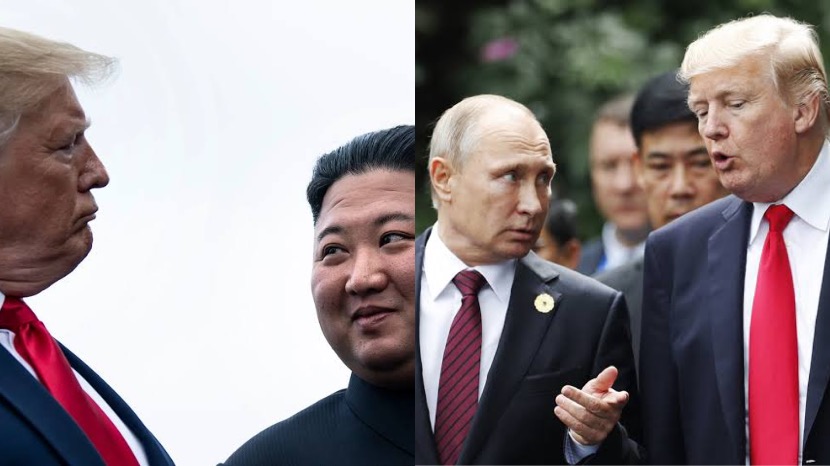NEWS
Russia President Vladimir Putin and North Korea Supreme Leader Kim Jong Un Confirm Attendance at Donald Trump’s 2025 Presidential Inauguration with the aim of reinforcing Global Alliances

Breaking: Vladimir Putin and Kim Jong Un Confirm Attendance at Donald Trump’s 2025 Presidential Inauguration
In a stunning diplomatic development, Russian President Vladimir Putin and North Korean Supreme Leader Kim Jong Un have both confirmed their attendance at former President Donald Trump’s upcoming 2025 presidential inauguration. The announcement has sent shockwaves through global political circles, raising questions about the implications for international relations and the strategic alliances shaping the future of geopolitics.
Putin and Kim’s participation marks an unprecedented moment in modern U.S. political history, signaling a potential shift in the global power dynamics and reinforcing the notion that Trump’s foreign policy has fostered unconventional relationships with leaders in Russia and North Korea. The two leaders’ presence at the event is seen as a symbolic gesture of solidarity and an endorsement of Trump’s “America First” approach, which prioritized strengthening ties with authoritarian regimes and challenging traditional diplomatic norms.
A Strategic Move for Global Alliances
The decision by Putin and Kim to attend Trump’s inauguration comes at a time of heightened global tensions. Putin, who has been a central figure in the ongoing conflict in Ukraine and has faced international isolation due to Russia’s aggressive foreign policy, may be seeking to align more closely with Trump’s non-interventionist stance. Kim, who has long maintained a strained relationship with the West, has also found common ground with Trump, particularly during their high-profile summits in Singapore and Hanoi.
Experts suggest that the attendance of these two leaders could signal a new phase in the geopolitics of the 21st century, with the U.S. potentially shifting away from its traditional alliances in Europe and Asia in favor of more unorthodox partnerships with nations like Russia and North Korea.
“Trump’s relationships with Putin and Kim represent a break from the typical Western diplomatic approach, and their presence at the inauguration is a clear signal that these leaders are hoping to further solidify their alliances,” said Dr. Elaine Mitchell, a professor of international relations at Georgetown University. “It’s a bold move that could reshape the global landscape in unexpected ways.”
Trump’s Foreign Policy and Its Global Impact
During his first term, Donald Trump’s foreign policy was characterized by a mix of isolationism, skepticism of traditional alliances, and overtures to authoritarian leaders. His relationship with Putin has long been a point of controversy, with critics accusing Trump of being overly deferential to the Russian president. Similarly, his engagement with Kim Jong Un raised eyebrows in diplomatic circles, as Trump downplayed North Korea’s nuclear weapons program and celebrated personal rapport with the dictator.
Now, with Trump running for president again in 2024 and preparing for a potential return to the White House in 2025, the confirmation of Putin and Kim’s attendance has amplified speculation about the direction of U.S. foreign policy under his leadership. Some analysts believe that Trump’s return could embolden these leaders, allowing them to assert greater influence on the world stage and potentially recalibrate alliances that have dominated the post-Cold War order.
Reactions from Washington and Beyond
Reaction to the announcement in Washington has been swift and mixed. While many of Trump’s supporters view the confirmation of Putin and Kim’s attendance as a positive sign of strengthening global alliances, critics are raising concerns about the implications for American credibility and security. Some argue that welcoming leaders with controversial records on human rights and democracy could damage the U.S.’s standing in the eyes of traditional allies and create new challenges in dealing with authoritarian regimes.
Senator Elizabeth Warren (D-MA) voiced her skepticism in a statement, saying, “The presence of Vladimir Putin and Kim Jong Un at Trump’s inauguration is a dangerous signal that the former president is continuing to embrace dictators at the expense of American values. We cannot afford to normalize these relationships on the world stage.”
On the other hand, Trump’s allies have framed the attendance of Putin and Kim as a triumph of diplomacy, with Trump’s former National Security Advisor, John Bolton, stating, “This could mark the beginning of a new era in U.S. foreign relations—one where we deal directly with powerful adversaries and seek to reshape the global order.”
What’s Next for Global Diplomacy?
With the 2025 inauguration still more than a year away, the attention surrounding Putin and Kim’s attendance is likely to intensify. It remains unclear whether this event will be a one-off display of unity or the beginning of a more profound shift in global alliances under a potential second Trump administration. As geopolitical tensions continue to rise, the implications of this unconventional alliance will be closely scrutinized by political leaders, analysts, and citizens around the world.
One thing is certain: the attendance of Vladimir Putin and Kim Jong Un at Donald Trump’s 2025 inauguration will undoubtedly make history, further complicating an already turbulent global political landscape and challenging established norms of diplomacy.












